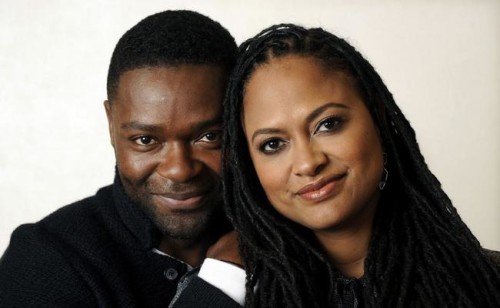
Written by Leigh Kolb as part of our theme week on the Academy Awards.
Two years ago, after Django Unchained was largely snubbed at the Oscars (compared to the Golden Globes), I looked at the history of the Black actors/characters who were awarded by the Academy over the years. Last year, I revisited that history as 12 Years a Slave dominated the awards circuit.
It’s fairly clear what roles Hollywood is most comfortable with: for Black characters, passivity, tired stereotypes, and villainy get the highest awards. Complex, powerful Black characters–especially those who appear threatening to white supremacy in some way–typically get passed over.
I hoped this year would be different. This year, institutionalized, implicit American racism seeped out of the pores of American cities and psyches post-Ferguson. This year, Ava DuVernay directed Selma, 5o years after the Selma to Montgomery march that led to the passage of the Voting Rights Act. The film is brilliant in its own right–DuVernay’s direction and David Oyelowo’s portrayal of Martin Luther King Jr. are incredible. Certainly the power of the film within the historical context would make the Academy sit upright and give credit where credit is due.
Instead, we got more of the same. Selma was recognized widely in Golden Globe nominations–best picture, best director, best actor, best original song (John Legend and Common’s “Glory,” which took home the award). And then, as always, the Academy turned up its white nose. While it’s up for best picture and and original song, DuVernay and Oyelowo were passed over.
At Rolling Stone, Peter Travers said,
“Why am I calling this year’s Oscars, on February 22nd, the ‘Caucasian Consensus,’ when Selma is one of the eight nominees for Best Picture? Because that landmark film about Martin Luther King Jr.’s 1965 civil-rights march has only one other nomination, for Best Song. Not one person of color appears among the 20 nominees for acting. Apparently, the Academy thought it gave last year when it awarded 12 Years a Slave the gold. The message from white voters? Don’t get uppity.”
Not one person of color.
I said that I had hoped this year would be different. However, when the Academy announced its nominations, I was not surprised.
I had to drive over an hour to watch Selma on the big screen, because none of the theaters in the small towns around me screened it (and they still haven’t).
This happened 20 minutes from my home.
The Voting Rights Act was gutted in 2013.
Writers had to defend DuVernay’s portrayal of an imperfect L.B.J.
In an interview, late author Chinua Achebe quoted the following proverb: “Until the lions have their own historians, the history of the hunt will always glorify the hunter.” This proverb perfectly, painfully illustrates Hollywood’s–and America’s–hegemonic forces at work.
The hunters write history. The hunters glorify themselves. The hunters’ history infiltrates itself into the very fabric of our cultural narrative, so we’re only comfortable with seeing the complexities of the hunters, and the simplicity of the lions.
Selma challenged that narrative. Oyelowo–who felt destined to play King–and DuVernay dared to glorified the lions.
And the hunters simply wouldn’t hear of it.

See also at Bitch Flicks: The Academy: Kind to White Men, Just Like History, Race and the Academy: Black Characters, Stories, and the Danger of Django, Captain Uhura Snub: The Politics of Ava DuVernay’s Oscar
Leigh Kolb is a composition, literature, and journalism instructor at a community college in rural Missouri.
2 thoughts on “The Academy’s White Noise: Silencing the Lions”
Comments are closed.